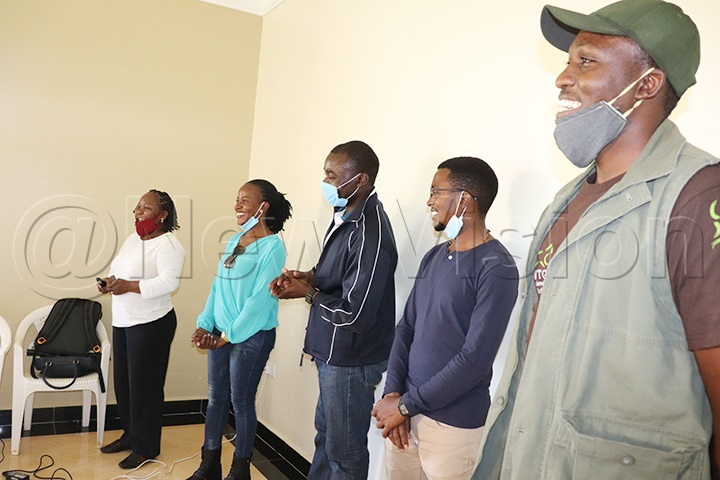Wakiso small-scale dairy farmers trained in best practices
Dec 02, 2020
“Our first phase is intended to benefit the small-scale dairy, especially in this neighbourhood. We want to demonstrate to them that even with a small piece of land and a small herd, one can profit from dairy farming."

FARMING
Hajati Mariam Namuyomba, who hails from Kasamba village in Busuka sub-county, Wakiso district has reared cattle for close to 12 years now. However, her tale is a mixture of joy and sorry.
On one hand, she has been able to get milk for her family and a little surplus for sale to raise money to meet the family's basic needs.
However, her other story is one full of misadventure. Being a small-scale farmer, she started off with two heifers.
With only two acres of land at her disposal, her only option was to try a mix of both zero-grazing and free range on some days.
"My first major setback was that I had to rely on a neighbour's bull to fertilise my heifers. Sadly, they took long to conceive, and when they eventually did, one of the calves died under circumstances," Namuyomba says.
She adds that during the dry season, it was also hard to feed her cow because the pasture was scarce or she had to rely on banana peelings from the neighbours.
Namuyomba's story is shared by Anatoli Kiberu Kanana, a 67-year-old farmer from Nagamba village in Nansana municipality, Wakiso district.
He has also kept cattle for 10 years now but with mixed fortunes.
"Currently, I have two cows at home but over the years I have had a tough time because the cows I had did not perform well in terms of milk production. It has been costly for me to feed them and to hire professional veterinary officers to treat them in case of infections. And with only one acre of land to rely on, I have even contemplated quitting trying to keep dairy cattle," Kiberu says.
Unfortunately, the two tales are what characterises most dairy farmers, whether small, medium or large-scale.

And indeed, this frustration was echoed by the over 20 small-scale farmers that were trained at Busuku demo dairy farm in Wakiso district last week.
Due diligence
Dr Dickson Tayebya, a lecturer at School of Veterinary Medicine and Animal Resources at Makerere University, who was a facilitator during the training, explained that the team of trainers had carried out research across the country to establish the actual challenges dairy farmers grapple with.
"Our findings indicated that there a major challenge with breed selection, feeding, disease management and the general management practices, among others.
That is why our team of trainers has experts in dairy breeding, good farming practices, animal health and veterinary drug use, pasture identification and management, among others," he said.
Makerere moves in to help
Realising the need to address the numerous challenges faced by dairy farmers in the country, Makerere University in collaboration with National Animal Genetic Resource and Data Bank initiated a project dubbed ‘Improving the Productivity of Dairy Farmers by Supporting Dairy Technology and Infrastructure' - otherwise referred to as - Korea Uganda Dairy Project .
Prof. Robert Tweyongyere, the project head and dean of the School of Veterinary Medicine and Animal Resources at Makerere University, said initially, they used to send students to South Korean farms for internship placements so that upon their return, they enforce best dairy farming practices in Uganda.
"However, over time, we realised that the intervention would be more effective if farmers and students received that hands-on training here in Uganda where it would be more applicable," he said.
Prof. Tweyongyere added that the people behind the project also realised the need to have a fully-fledged training demonstration centre in the country that covers the entire value chain of dairy farming.
He says that is why the demonstration centre at Busuku in Wakiso district is being set up.
"Our first phase is intended to benefit the small-scale dairy, especially in this neighbourhood. We want to demonstrate to them that even with a small piece of land and a small herd, one can profit from dairy farming.
"Our training centre here in Busuku will empower farmers on how to identify a good dairy breed, the best feeding programme for optimum productivity, silage and haymaking, pest/disease management and control, basics of zero-grazing, and above all value addition," he explained.
Prof. Tweyongyere added that the long-term is to admit students at the institute who will receive a holistic training in the dairy farming value chain.
Prof. Tweyongyere said the three-year project is working in collaboration with Chonuk National University and are funded by the Korea Rural Community Cooperation.
Farmers upbeat
The over 20 pioneer small-scale dairy farmers were optimistic that with the training, their fortunes can only get better.
"For instance, I feel more knowledgeable on how to prevent and identify sicknesses among the herd. I will also be more careful with what I feed my cows, especially adoption of silage and feed supplements," Namuyomba said.
For Kiberu, the best tip of the day was the need to provide his cows with enough drinking water as this has a huge impact on the health of the cow and milk production.
The trainers were also oriented on how to use locally available materials to construct good structures as well as the need to embrace artificial insemination.
